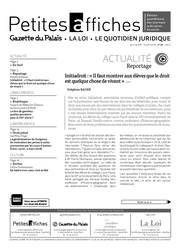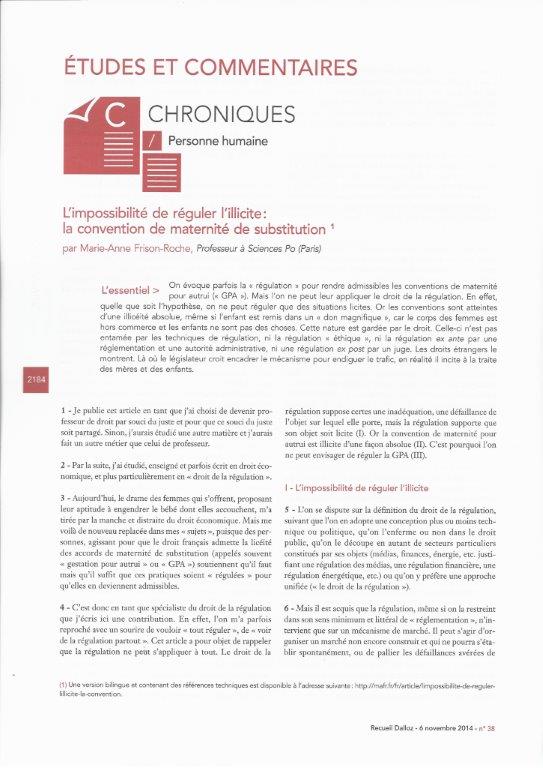May 31, 2018
Thesaurus : Doctrine

Référence complète : Jouannet, P., Procréation par don de gamètes et accès aux origines, in Petites Affiches, Lextenso, 2018, pp.6-8.
Par les moyens médicaux qu'elle procure, la société, reconnaît, autorise, organise des procréations impliquant un don d'ovocytes ou de spermatozoïdes. Les enfants qui naissent n'ont pas de lien biologique avec l'un ou l'autre de leurs parents et certains d'entre eux revendiquent le droit de connaître l'identité du donneur ou de la donneuse. Cette vérité biologique influence-t-elle la quête des origines et modifie-t-elle notre imaginaire collectif de la filiation ?
April 12, 2018
Thesaurus : Doctrine

Référence complète : Espace de réflexion éthique de Normandie (EREN), Le don de gamètes : quelles questions pour le XXIe siècle ?, in Petites affiches, Lextenso, avril 2018, pp. 5-9.
Parmi les sujets débattus dans le cadre des États généraux de la bioéthique, l’assistance médicale à la procréation et le don de gamètes soulèvent de nombreuses questions. Un débat organisé à Caen, par l’Espace de réflexion éthique de Normandie, a permis de discuter des enjeux associés à une éventuelle levée de l’anonymat du don et à la possibilité d’accéder à certaines données informatives sur les donneurs de gamètes.
Les étudiants de Sciences-Po peuvent lire l'article via le Drive, dossier "MAFR- Regulation & Compliance"
March 9, 2018
Thesaurus : Doctrine

Sylviane Agacinski explains her book on two subjects: "gestation for others" on the one hand, organ harvesting from corpses on the other.
Read a presentation of Sylviane Agacinski's book: Le tiers-corps. Réflexion sur le don d'organes.
Listen to Sylviane Agacinski's interview on France-Culture.
During this interview, Sylviane Agacinski recalls that the principles insofar as they pose the dignity of the human person and their respect do not have to be "reviewed".
She notes that the method which from the outset posed the revision of the bioethics law, which does not at all imply the revision of these principles, does not lead under the pretext of a "societal evolution" and by soliciting opinion public in this way.
She challenges the definition of ethics which would be "limit the damage", in particular in the area of surrogacy.
So that one cannot conceive of ethical GPA, in particular because it is always remunerated.
It is as if when, at the time of the abolition of slavery, the solution of "ethical slavery" had been considered;
In the program is broadcast a sound extract from Ogien, who said that the exchange between two people should be admitted because it is a fact and that the law must frame it. To deny it is, according to him, a blindness.
Sylviane Agacinski completely disputes this position. She says it is by no means a "double gift", but a real market. She points out that Ogien was a libertarian, that he believed that one is "owner" of his body and that one can therefore dispose of it, and that he therefore admitted that one can sell it. She believes that this is an "intrinsic abuse" and should not be admitted.
In the program, we then ask Sylviane Agacinski if she would admit these practices if we managed to remove any market dimension?
She says it never happens, that there is always money. And that even if, as an exception, for example between sisters, this happened, one cannot appropriate the pregnancy of another and that the intended result is to attribute to oneself a child, who is the object of the transaction. It is no longer even the "third body" which is an instrument, but rather a "depersonalization", the woman who "serves" is "inhuman".
Sylviane Agacinski radically criticizes the notion of "presumed consent". She claims that this notion does not make sense. When the consent expresses the will (as in marriage), either we say "yes" or we say "no", we can not impute to you what thing like "I do not say no".
She advises us to look at the way in which the Germans are evolving in this matter, which does not go towards the concept of "presumed consent" but towards a completely different concept: solidarity. In this sense, it should be said that the body after death could become more available, not by liberalism but by solidarity, not for the benefit of companies but as "common good".
Thus the bodies would be "transmitted" and not "appropriate". Families could understand this, while the appropriation of bodies by others, they cannot understand, which the legal concept of "presumed consent" snatches from them which is not logical.
For Sylviane Agacinski, this notion of "post-mortem organ donation" for which there would be presumed consent is not the right way. It leads to liberalism, while the right path is that of solidarity, a path from which we are moving away. We are moving away from "humanitarian donations" because we do not expect reciprocity, while by "presumed consent" we expect indirect reciprocity in a "generalized exchange" (Mauss). It is then a question of managing a "shortage of organs", as one does on a market ....
An extract from Sylviane Agacinski's book is read, which states that if there are no laws, there will be no limit.
It effectively takes up this assertion that it is the Laws alone that can protect human beings, and if the Laws do not and if "all taboos are lifted" then everything becomes possible. It refers to Nazism which lifted the taboos and did so by law. And then everything became human material.
March 1, 2018
Thesaurus : Doctrine

Complete reference : Agacinski, S., Le Tiers-corps. Réflexions sur le don-d'organes, coll. "La librairie du XXIe siècle", Seuil, 2018, 240 p.
Consult the table of contents.
Listen to his interview on France-Culture.
June 9, 2016
Blog

La rhétorique du "don magnifique" pour justifier la GPA fait long feu.
Tout montre que les femmes ne "consentent" à donner leur corps et à fabriquer des enfants qu'à seule fin de les céder que pour de l'argent.
Cet argent, on le retrouve partout : non seulement dans les honoraires versées aux agences, aux cliniques, aux médecins, aux avocats, dans les "cotisations" versées aux associations basées à Londres qui partagent les informations entre candidats à la parentalités, dans la "compensation financière" que la mère reçoit dans la "GPA altruiste".
Cette "GPA altruiste", les partisans de la GPA la soutiennent "altruiste" parce qu'elle serait "gratuite". Devant le flot d'argent qu'engendre le marché de la production industrielle des enfants à partir de la matière première disponible des femmes pauvres et fertiles, qui reçoivent de l'argent, cela devient de plus en plus difficile à soutenir...
Les entreprises et leurs conseils qui veulent construire l'industrie et le commerce mondiaux de la GPA ont donc trouvé une parade rhétorique : "l'argent n'est pas contradictoire avec le don" ! C'est même le contraire : l'argent renforce l'amitié entre le bénéficiaire et les "donneuses", c'est donc un instrument du don. Voilà comment la figure du don et du contre-don est reconstruite par la sophistique, à travers un très long article de 2010 du New-York Times
Lire ci-dessous.
Nov. 6, 2014
Publications
 ► Référence complète : M.-A. Frison-Roche, « L'impossibilité de réguler l'illicite : la convention de maternité de substitution", D. 2014, pp.2184-2187.
► Référence complète : M.-A. Frison-Roche, « L'impossibilité de réguler l'illicite : la convention de maternité de substitution", D. 2014, pp.2184-2187.
____
____
🚧Lire le document de travail, bilingue, doté de développements supplémentaires, de références techniques et de liens hypertextes.
Le thème a également donné lieu à un article de presse générale, publié dans le Huffington Post le 20 octobre 2014 sous le titre Les limites des bienfaits de la régulation : la convention de maternité de substitution (GPA)
____
► Résumé de cet article : On évoque parfois la "régulation" pour rendre admissible les convention de maternité pour autrui ("GPA"). Mais l'on ne peut leur appliquer le droit de la régulation. En effet, quelle que soit l'hypothèse, on ne peut réguler que des situations licites. Or, ces conventions sont atteintes d'une illicéité absolue, même si l'effet est remis dans un "don magnifique", car le corps des femmes est hors-commerce et les enfants ne sont pas des choses.
Cette nature est gardée par le droit. Celle-ci n'est pas entamée par les techniques de régulation, ni la régulation "éthique", ni la régulation ex ante par une réglementation et une autorité administrative, ni une régulation ex post par un juge. Les droits étrangers le montrent.Là où le Législateur croit encadrer le mécanisme pour endiguer le trafic, en réalité il incite à la traite des mères et des enfants.
________